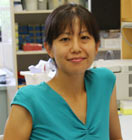
Trainee Spotlight: Shoko Nogusa, PhD
-
Shoko Nogusa, PhD

Postdoctoral Associate
Dr. Sid Balachandran’s lab
Fox Chase Cancer Center
[email protected]Biography
I first became interested in research during my undergraduate at Drexel University through hands-on experiences in environmental field research and immunology. However, it was this last experience that captured my attention, perhaps not surprisingly, as I had always been fascinated by how the human body functions. These experiences directly led me to pursue a BS/MS dual degree in Dr. Liz Gardner’s lab at Drexel University, where I worked on understanding how nutrition and microgravity from space flight, affected immune responses. I learned that the answer to most biological phenomena could be uncovered through experimentation. After attaining my Masters in 2006, I continued on to graduate school to work with Dr. Donna Murasko’s lab at Drexel University, where I studied age-related changes in immune response to acute influenza infection with a focus on natural killer cell function. After completion of my doctorate degree in 2010, I joined Dr. Sid Balachandran’s lab at Fox Chase Cancer Center to widen my scientific knowledge and technical skills in molecular biology. During my time at Fox Chase, I have established the influenza infection model, which, combined with conventional molecular methods, elucidated the mechanisms in which influenza infected cells activate a parallel cell death pathways as a host defense method. My career goal is to contribute to a better quality of life of individuals by exercising my experiences in unique combination of immunology, virology, nutrition, and molecular biology.
Research Overview
Influenza A virus, an enveloped single-stranded RNA virus with segmented genome, infects up to 20% of U.S. population during seasonal epidemics despite the development and wide-spread availability of vaccines. Furthermore, with the emergence of an avian flu strain and recent mutations of the viral genome, an increasing percentage of the human population is now susceptible to seasonal flu. To overcome the seasonal flu, infected cells need to be eliminated from the host to limit viral propagation and to control immuno-pathological responses. The elimination of infected cells is achieved by apoptosis- and necrosis-mediated cell death pathways, although little is known about these pathways. In this study, we dissected flu-induced cell death pathways, identifying a central role for the RIPK3 kinase in triggering death through activation of a parallel MLKL-dependent necroptosis and FADD/caspase-8-mediated apoptosis. In addition, activation of RIPK3 not only prevents the infected cells from becoming virus factories, but also promotes activation of adaptive immune response through the release of danger-associated molecular patterns. Our work demonstrates that the maintenance of RIPK3 kinase activity is important for anti-influenza treatment and recovery.
Featured Publication
RIPK3 Activates Parallel Pathways of MLKL-Drien Necroptosis and FADD-Mediated Apoptosis to Protect against Influenza A Virus.
Nogusa S, Thapa RJ, Dillon CP, Liedmann S, Oguin TH 3rd, Ingram JP, Rodriguez DA, Kosoff R, Sharma S, Sturm O, Verbist K, Gough PJ, Bertin J, Hartmann BM, Sealfon SC, Kaiser WJ, Mocarski ES, Lopez CB, Thomas PG, Oberst A, Green DR, Balachandran S. Cell.Host.Microbe. 2016.
